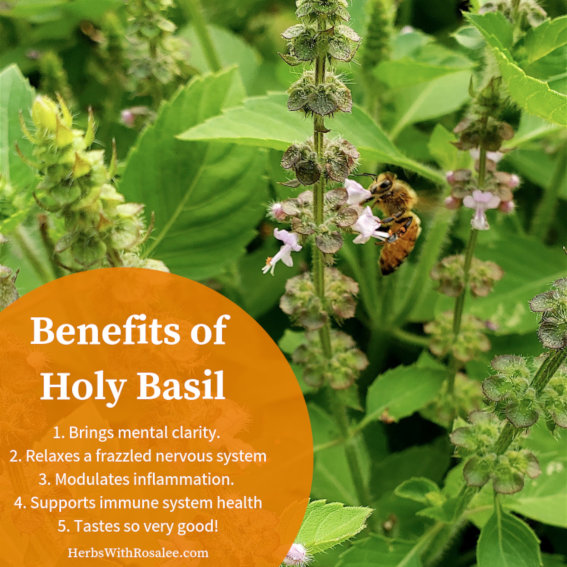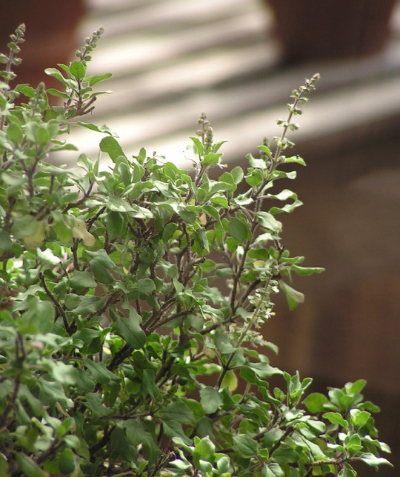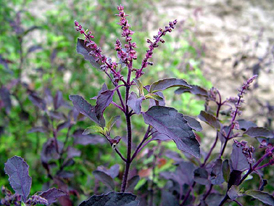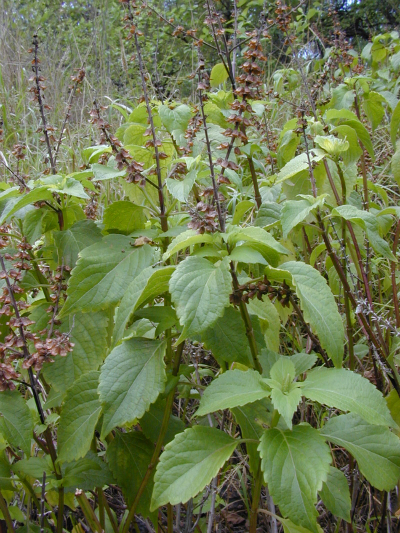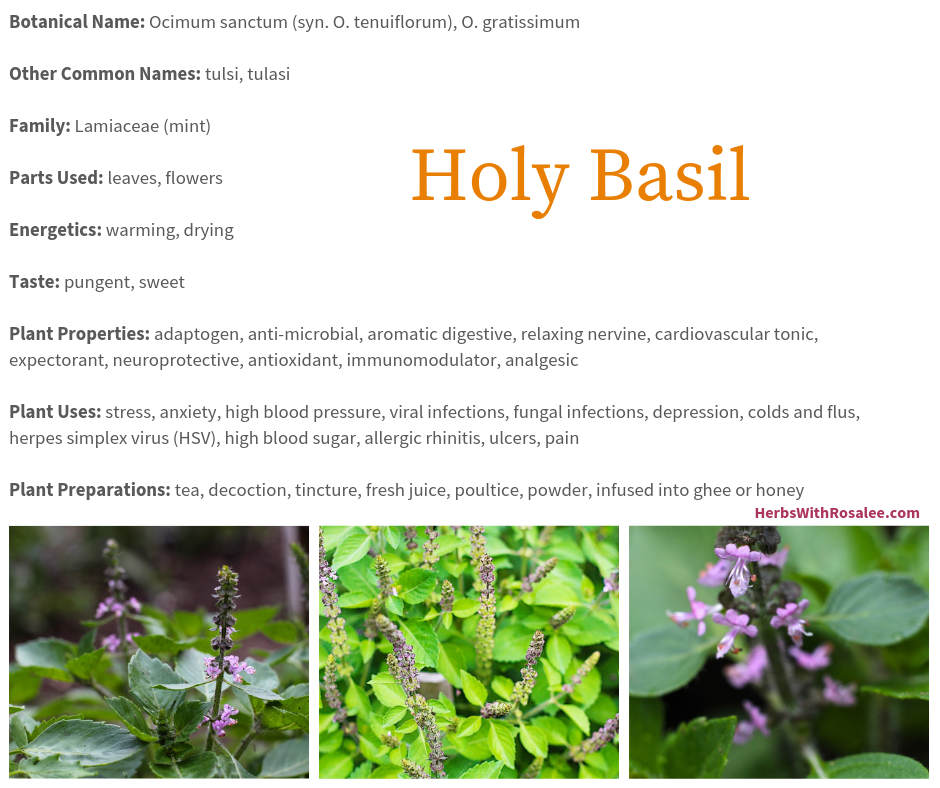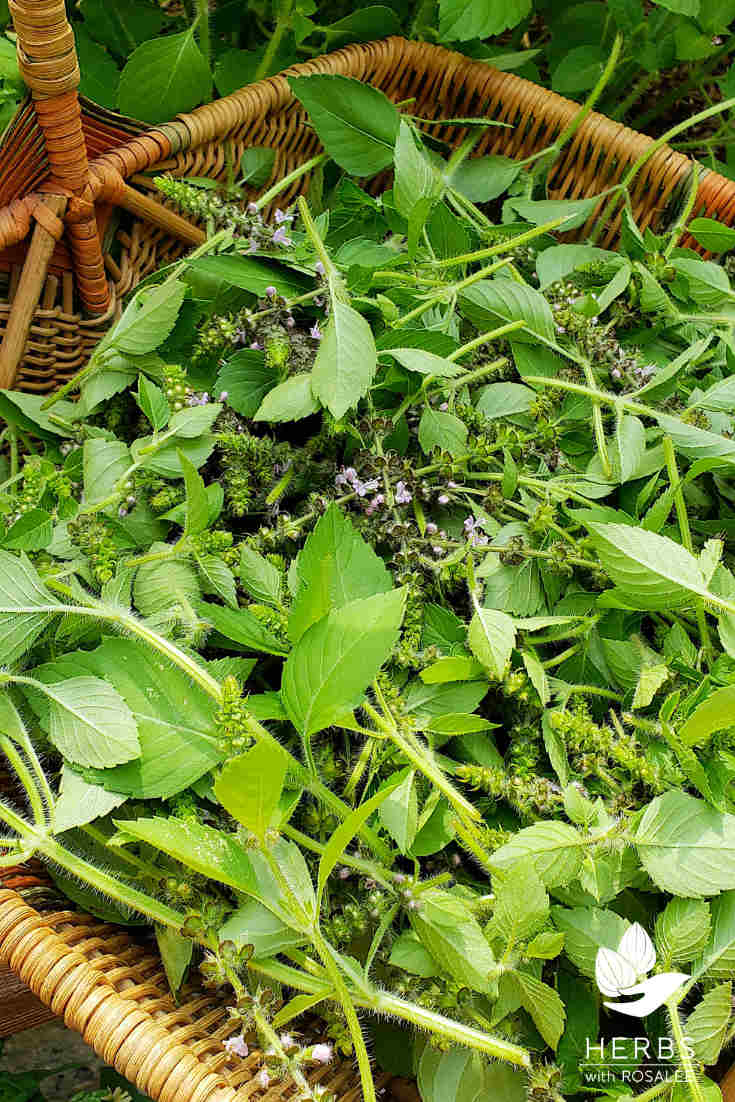Get weekly tips, recipes, and my Herbal Jumpstart e-course! Sign up for free today.
Health Benefits of Tulsi
Share this! |
|
In this episode, you’ll learn all about the health benefits of tulsi (also known as Holy Basil or Ocimum sanctum) for your heart, immune system, brain health and so much more. In fact, there’s so much to know about the health benefits of holy basil that I decided to record this episode in two parts. Watch part two, all about the Health Benefits of Tulsi Tea and Tulsi Tea Side Effects here.
In the meantime, I’m also sharing a beautifully illustrated holy basil ebook to give you an easy way to keep all the information I share today organized.
After listening in, you’ll know:
► The differences between the four varieties of holy basil
► Why certain herbs (including holy basil) are often best taken daily over a long period of time
► Which commonly-used mouthwash active ingredient was outperformed by holy basil extract
► Five health concerns which can be benefited by holy basil’s ability to decrease unwanted and chronic inflammation, as demonstrated by clinical studies. This is a big deal because most chronic diseases have some component of systemic inflammation! (As an aside, one of my passions is helping people figure out how to best work with herbs and lifestyle changes to powerfully reduce chronic inflammation so that they can finally address the root cause of their chronic illness. If that’s something you or someone you love could benefit from, be sure to check out my free training at: http://herb-training.com)
► How holy basil can be worked with to address cold sore outbreaks, ringworm, or eczema
► Why holy basil can be a wonderful ally during cold and flu season (plus four other herbs you might consider taking at the same time)
► and so much more…
-- TIMESTAMPS --
- 00:00 - Introduction to Holy Basil syn. Tulsi (Ocimum sanctum)
- 05:29 - Holy basil (Tulsi) energetics
- 05:57 - Holy basil (Tulsi) benefits for addressing stress
- 08:08 - Holy basil (Tulsi) benefits for cognitive health
- 09:29 - Holy basil (Tulsi) for better digestion
- 10:36 - Holy basil (Tulsi) for oral health
- 11:52 - Holy basil (Tulsi) for inflammation
- 14:07 - Holy basil (Tulsi) for insulin resistance and Type 2 diabetes
- 15:13 - Holy basil (Tulsi) for musculoskeletal pain
- 15:42 - Holy basil (Tulsi) for your immune system
- 20:29 - Herbal tidbit
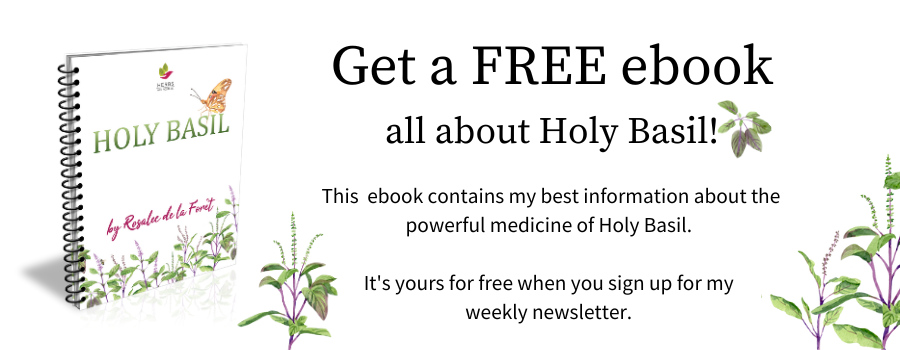
Transcript of the Health Benefits of Tulsi Video
Holy basil refers to many different plants that are originally from India and east Africa.
First thing we need to dive into regarding holy basil benefits is what exactly is holy basil?And what’s the difference between holy basil and tulsi?
This last one is the easiest. Holy basil and tulsi often refer to the same plants. I use the two names interchangeably.
But, knowing what holy basil is gets a little more confusing.
There are at least four different types of holy basil, and while they can be worked with somewhat interchangeably, they also have their differences. There’s a lot of confusion over the different varieties of holy basil. This year I got a set of seeds from Strictly Medicinal Herbs. They took on the project of growing confirmed seed varieties in isolation so you really know that you’re getting the correct variety. If you have a garden I recommend growing the different varieties so that you get see the different health benefits of tulsi for yourself.
Here’s a look at the different varieties:
Rama and Amrita tulsi (Ocimum sanctum) have purple stems with green leaves, which are sometimes tinted with a bit of purple. They can grow to up to 4 feet with flowers that are reddish purple. This is the kind most commonly grown in India.
Krishna tulsi (Ocimum tenuiflorum) has dark purple leaves and makes an excellent tea.
Temperate Tulsi, also commonly called Kapoor tulsi (Ocimum africanum) has green leaves and purple flowers, grows in a compact form, and has a fruity fragrance. This type is commonly sold by many general seed companies and is the one I’ve worked with the most.
Vana tulsi (Ocimum gratissimum), is a perennial basil that can be easily overwintered indoors. Native to India and East Africa, it grows in the wild and it can be easily cultivated in tropical or subtropical climates.
For over 3,000 years holy basil, or tulsi, has been revered as one of India’s most sacred and powerful plants. Think about that. Ayurveda, one of the oldest and most sophisticated systems of medicine in the world, reveres this plant. That’s saying a lot!
As you might imagine, a plant that holds such high esteem in an entire culture must be an amazing plant. And it is. There are so many health benefits of tulsi that it will leave you asking, “What can’t it do?”
Holy basil is a sacred plant in the Hindu religion and grows abundantly in subtropical climates. The species name, sanctum, refers to this sacredness. In Sanskrit, tulsi means “beyond compare.” It is also referred to as an elixir of life, queen of herbs, and Mother Nature of medicine in the Hindu culture.1
My friend from New Delhi, India, tells me that he was taught to give reverence to this plant every morning before his feet even touch the earth. Many Hindu families grow their own tulsi plant in their home, for spiritual as well as medicinal purposes.
This plant is sacred to the Hindu god Vishnu. Vishnu’s wife, Tulasi, took the form of this herb when she came to earth. Besides being used in morning prayers, the wood of tulsi is used as beads in meditation, similar to how many cultures use other prayer beads.2
If you fall in love with tulsi too then I recommend the book Tulasi Devi: The Goddess of Devotion.
Do you have experience with the health benefits of tulsi? I’d love to hear about it in the comments on YouTube or at the bottom of this page. Your comments mean a lot to me! I love cultivating a community of kind-hearted plant-loving folks! Plus, it’s always interesting and insightful to hear the experiences of plant lovers out there. Your suggestion may also help others!
Health Benefits of Tulsi: Energetics
Holy basil is a wonderfully aromatic herb. Energetically it is slightly warming and is classified as a pungent herb. Because of its warming and aromatic properties it moves stagnation. I also find that its scent is uplifting. A cold infusion of the flowering tips of the temperate tulsi is noticeably demulcent.
I’ll share more about the benefits of tulsi tea in Part II of this series.
Health Benefits of Tulsi for Addressing Stress
One of holy basil’s benefits is being an adaptogen herb.
Adaptogenic herbs, by definition, are herbs that are non-toxic and used to generally support the health of a person under stress in non-specific ways. Adaptogens influence the HPA (hypothalamic-pituitary-adrenal) axis and are used to positively address many nervous system issues, including the negative effects of excessive stress, anxiety, insomnia, depression, overwork, and more.
Ayurvedic medicine refers to holy basil as a rasayana, which is a Sanskrit term meaning "to lengthen the lifespan.“ In the book Adaptogens, David Winston and Steven Maimes define a rasayana as “an herb that nourishes a person’s growth to perfect health and promotes long life.”3
People often say that they don’t want to rely on herbs for the rest of their life. In this sense, people are equating herbs with pharmaceutical drugs, which are often taken as a crutch to suppress symptoms. However, around the world, herbs are regularly taken as way to ensure vibrant health and prevent the types of long-term and chronic diseases that plague people living the stressful modern life. Adaptogenic herbs like holy basil are often taken daily over a long period of time to gain the protective benefits.
Holy basil can be considered a balm to the entire nervous system. It can be taken daily to support good health or relied upon frequently to address many nervous system complaints.
In a two-month study, 35 patients with anxiety were given 500 mg of holy basil twice daily after meals. The final observations were that holy basil positively affected general anxiety levels as well as the stress and depression that accompany anxiety. The researchers concluded that “O. sanctum may be useful in the treatment of [generalized anxiety disorder] in human[s] and may be a promising anxiolytic agent in the near future.”4
Cognitive Health Benefits of Tulsi
Another one of the health benefits of tulsi is for your brain health.
In the book Adaptogens, Winston and Maimes refer to holy basil as a cerebral stimulant and recommend it for people with mental fog. They say,
“It can be combined with other cerebral stimulants such as rosemary, bacopa, and ginkgo to help people with menopausal cloudy thinking, poor memory, attention deficit disorder and attention deficit hyperactivity disorder, and to speed up recovery from head trauma.”5
Holy basil extract capsules were shown to have a positive effect on cognitive health, including better reaction times and minimized error rates in humans taking it for as little as 30 days.6
My friend and fellow herbalist Christophe Bernard describes his experience of holy basil as follows:
“It brings me back into my body, from the overactive Vata part of me. When there is a whirlwind of ideas and planning of future projects, when I am gardening but not even there, lost in my head, it brings me back into my body. Mind clarity, yes, but a clarity of the present moment, and a sharpening of all the senses. I see and hear more sharply, I feel the sun on my skin, the weight of my body. I am more in tune with intuition. Things slow down a bit.”7
Health Benefits of Tulsi for Better Digestion
Holy basil has many positive benefits on the digestive system. As a slightly warming/pungent and aromatic herb, it is used to improve stagnant or stuck digestion, characterized by bloating, gas, decreased appetite, and/or nausea. It’s often paired with dried ginger for this purpose.
A 2019 clinical trial found pharmaceutical drugs for gastric ulcer were more effective when taken with a combination of coconut oil and holy basil.8
A fantastic way to enjoy the health benefits of tulsi for digestion is to eat the plant! There are countless ways to enjoy holy basil as food and one of my favorites is with a recipe by Lucretia VanDyke called Herbal Love Pancakes featuring holy basil, lemon balm and roses. You can get this recipe and hear even more about holy basil by listening or watching to the interview I did with Lucretia here.
Oral Health Benefits of Tulsi
Another holy basil benefit is for oral health.
An in vitro study showed that a holy basil extract was effective against periodontal pathogens.9
Another study found that a holy basil extract mouthwash was more effective at reducing the bacteria that causes cavities than a mouthwash using sodium fluoride.10
A third study performed on volunteer medical students found that holy basil mouthwash was equally effective in reducing plaque and gingivitis as the disinfectant chlorhexidine gluconate. Those using the holy basil mouthwash didn’t experience the same negative effects associated with chlorhexidine. The researchers concluded, “The results of the present study indicate that Ocimum sanctum mouthrinse may prove to be an effective mouthwash owing to its ability in decreasing periodontal indices by reducing plaque accumulation, gingival inflammation and bleeding.”11
An in vitro test also showed that holy basil has potential against oral cancer cells.12 Human clinical trials are needed to further assess this action.
Health Benefits of Tulsi For Inflammation
Holy basil has the amazing benefit of decreasing unwanted and chronic inflammation. This is a big deal because most chronic diseases have some component of systemic inflammation! Next I’ll share how the health benefits tulsi of being anti-inflammatory can help people with metabolic diseases like type 2 diabetes and heart disease.
But first, let’s look at a couple of studies showing the health benefits of tulsi for addressing inflammation.
A 2021 clinical trial showed that patients with COVID-19 fared much better when taking an herbal combination of holy basil, ashwagandha and Tinospora cordifolia. The researchers concluded that this herbal blend helped to clear the virus, which resulted in a faster recovery which then reduced the risk of spreading the virus. One reason they gave for all these benefits was that there was a significant reduction in inflammation markers in the treatment group.13
A 2022 in vitro study showed that holy basil plants were effective against a variety of microorganisms that grow on the scalp. The researchers concluded that, “Therefore, [holy basils] are potentially natural anti-inflammation and antimicrobial agents for topical applications in the pharmaceutical and cosmetic industries.”14
As I mentioned, chronic inflammation is THE leading cause of most chronic diseases including heart disease, arthritis, back pain, skin conditions like eczema and acne, type 2 diabetes and so many more.
One of my passions is helping people figure out how to best work with herbs and lifestyle changes to powerfully reduce chronic inflammation so that they can finally address the root cause of their chronic illness.
If you’d like to know how to work with herbs holistically, for your chronic illness, then definitely check out my free training: How to Use Herbs to Transform Your Health to get More Energy & Vitality – Without Expensive Supplements or a Restrictive Elimination Diet.
You can access this free training at herb-training.com.
Health Benefits of Tulsi for Insulin Resistance and Type 2 Diabetes
Holy basil has been shown to have positive benefits for people with insulin resistance and type 2 diabetes.
A 2016 study showed that young people taking 250 mg of holy basil extract twice a day on an empty stomach for eight weeks had significant improvements in lipid profiles and insulin levels.15
A one-month study of 27 patients with non-insulin-dependent type 2 diabetes showed a significant lowering of blood glucose and a significant reduction in total cholesterol, LDL, cholesterol, VLDL cholesterol, and triglycerides.16
Herbalists also often recommend holy basil as a way to support general cardiac health, and we know that heart disease is a common simultaneous symptom of metabolic disorders like type 2 diabetes.
In Ayurveda, a famous formula for protecting the heart includes holy basil, arjuna, and hawthorn. In part II of this episode I’ll share my favorite tea formulation for heart health.
Health Benefits of Tulsi for Musculoskeletal Pain
Another one of the health benefits of tulsi is that it can decrease chronic pain.
Research has shown that holy basil is a COX 2 inhibitor, similar to many pharmaceutical pain medications, making it useful against arthritis and other inflammatory conditions.17 Holy basil is high in eugenol, a volatile constituent also found in cloves, which is helpful in decreasing pain.
Health Benefits of Tulsi for the Immune System
The health benefits of tulsi include strengthening and modulating the immune system.18
It can be taken to both prevent and to address active/acute upper respiratory viruses like colds or influenza. As an expectorant herb, it also has an affinity for supporting the body to remove mucus from the lungs, so it can be used for bronchitis as well as pulmonary weakness. I like to combine it with ginger for this purpose.
In my own clinical practice, I’ve seen holy basil, taken over time, have a beneficial effect on asthma. It has also been shown to be helpful in alleviating hay fever symptoms associated with seasonal pollen allergies.
Two studies looked at a tea formula of five common herbs from India: holy basil, ashwagandha, licorice, ginger, and cardamom. They gave this tea blend to volunteers aged 55 or older with a history of recurrent coughs or colds.
The study showed that “regular consumption of the tea fortified with Ayurvedic herbs enhanced NK cell activity, which is an important aspect of the (early) innate immune response to infections.”19
As an anti-microbial herb, holy basil can be used topically or internally to treat bacterial, viral, or fungal infections. It has been shown to be effective against the fungus Candida albicans in vitro.20 It is frequently used for viral herpes simplex (HSV) sore outbreaks and can also be applied externally to ringworm (fungal) infections and eczema reactions.
Numerous in vitro studies have shown holy basil’s positive effects against various cancers.21, 22 Human clinical trials will be able to shed more light on this potential holy basil benefit.
 An altar with tulsi for daily worship in a courtyard in India
An altar with tulsi for daily worship in a courtyard in IndiaOkay, I’ve shared a lot of health benefits of tulsi with you! And because this is so extensive I want to make sure you have this information readily available! As an herbal teacher, my success is seeing your success, so I love supporting you along the way!
That’s why I’m sharing a Holy Basil ebook, which is beautifully illustrated and contains the information I’ve just shared. To access your free ebook simply sign up below!

Citations for Health Benefits of Tulsi
Click to show/hide.

Rosalee is an herbalist and author of the bestselling book Alchemy of Herbs: Transform Everyday Ingredients Into Foods & Remedies That Healand co-author of the bestselling book Wild Remedies: How to Forage Healing Foods and Craft Your Own Herbal Medicine. She's a registered herbalist with the American Herbalist Guild and has taught thousands of students through her online courses. Read about how Rosalee went from having a terminal illness to being a bestselling author in her full story here.

